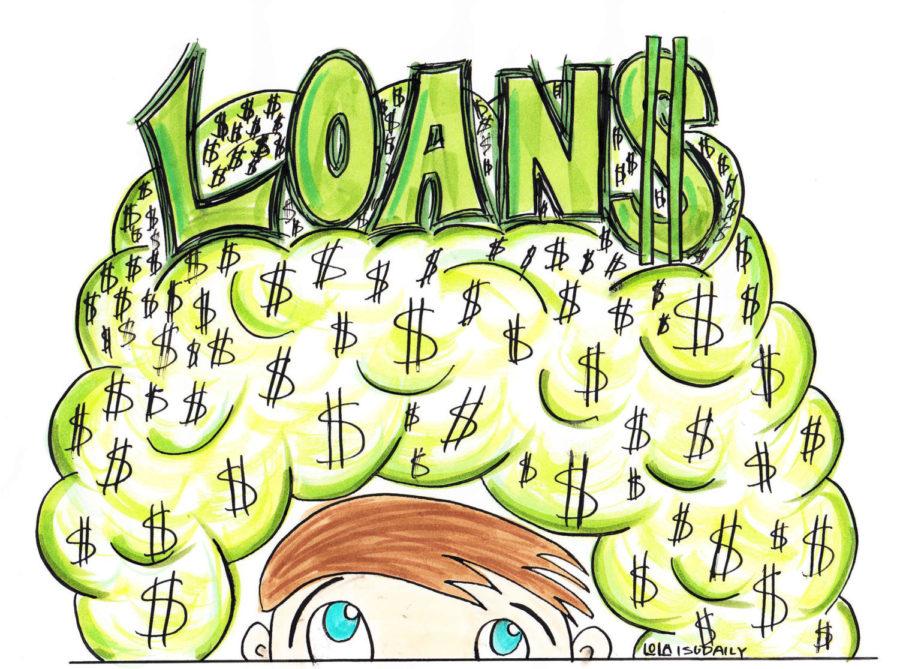Titus: Working hard only to be broke
Leah Stasieluk/Iowa State Daily
In 2013, USA Today ranked the state of Iowa as No. 6 for schools with the most student debt, with the 2013 average student loan debt piling up to nearly $30,000. About 72 percent of college students in the state of Iowa take out student loans.
October 18, 2013
John is a recent graduate of Iowa State. He is starting out at his new career making approximately $30,000 a year. John is beginning a new life. He has a car and a house, and wants to be able to start a family soon. John has one thing that looms over him, one thing that is going to hold back John from some of the things he wants to start his life: the heavy weight of student loans.
USA Today ranked the state of Iowa No. 6 for schools with the most student debt. At Iowa State, 72 percent of students take out student loans. The debt of the average student graduating in 2013 will pile up to nearly $30,000. Imagine — $30,000 in debt. As recent graduates just starting new jobs, how will we be able to pay off our debt?
For John to pay off his loans, it would take an entire year’s salary. He is going to have to save up and pay over a few years rather than all at once. What about the graduates who don’t get a job right away? The poverty line in America for a one-person household is $11,490. This means that what we are paying back in student loans more than doubles what people below the poverty line have to live off of. The poverty line in America for a family of four is $23,550.
Times are tough in America and struggling parents cannot afford to send their child to school when the amount that they will be paying in loans is higher than the amount they are bringing into the household. To think, that cost is only for one child. If both children want to attend college, the debt the parents would be facing would be nearly unmanageable; now imagine families with three, four, five children.
Let’s say, in a different case, John graduates and doesn’t start his career right away. He is working day in and day out in a local diner to pay off his student debt, but in this situation, he is living below the poverty line. If he makes $15,000 a year and pays $100 a month, John will be paying for his student loans for 25 years. It looks like John can kiss the new car and new house goodbye. If John chooses to start a family after graduating, his loans will take even longer to pay off. He will have to put the life he desires on hold in order to pay off his debt. What does all of this information mean for students?
Thankfully, many students are able to receive money from the FAFSA, Pell Grants and scholarships. These three things help diminish debt for many individuals. For the students who are not receiving any financial support, it would be wise to think about paying off student debt sooner rather than later.
Many loans are unsubsidized and will gain interest over time, so paying on loans now would be more beneficial than waiting and paying on them later. Gaining a college education is important in today’s economy and in order to get ahead, we, as graduating students, may have to start out behind.
For families living below the poverty line, there are financial aid options. Students with a greater financial need can get larger amounts from their FAFSA, as it is based in part off of parents’ incomes. As more and more students from low income families receive college educations, the opportunity to change meritocracy in the United States increases.
“Your future is what you make it” becomes more of a truth every day as more and more students attend college to get higher paying jobs.
Student loans do not look as though they are going to be going away any time soon for any of us. The sooner we start paying, the sooner they will disappear. Finishing school in the allotted time you plan to attend and beginning to pay off loans before you graduate will help decrease student debt.
After graduation, when we go out and get our “big kid” jobs, it will be beneficial for us to pay ahead, or more than the minimum per month. Nobody wants to spend 25 years paying off our student loans, because, like John, we want new homes, cars and families.
What we all want is to escape the looming cloud of debt and find the sunny side of life — the sooner, the better.

















